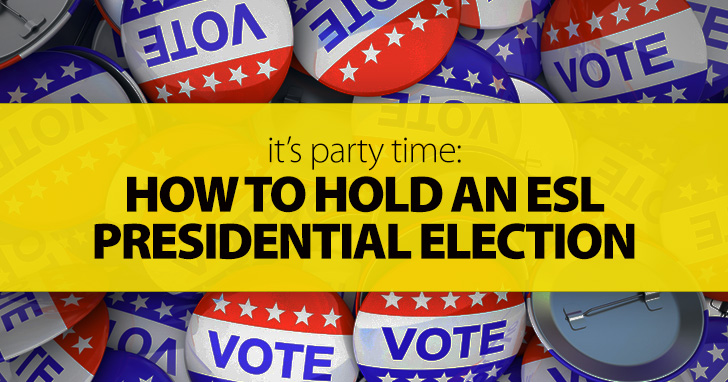
Few things are as illustrative of life in the modern US and UK than the way we handle our elections.
Idolized by some, demonized by others, mystifying to many, they embody our most lofty principles while exposing the limitations and vagaries of our media and our political systems, often in ways which are hard to explain, and even harder to justify. For our students, witnessing a real election, particularly a general or presidential race, can be an exhilarating opportunity to learn about the process itself, but also about how that process reflects the history of the nation, how its people view their own leaders and how media and money play a role.
Holding your own presidential election in an ESL classroom is easier and quicker than you might think. All that’s required are a couple of fictional candidates, each with a well-defined platform, some debating skills and question forms, and then a free ballot at the end. I thoroughly enjoy this exercise because it allows my students to learn about themselves and each other, and to practice a range of very useful language in an entertaining and relevant setting.

Setup
A good place to start is to brainstorm election systems from your students’ home countries. What are your students used to seeing? How much of a ‘western’ election will appear strange and unusual, and how much will be familiar? Have your students interview each other (which is a lot more fun, and better practice, than simply answering a written questionnaire, for example) based on questions like these:
- How often do elections happen in your country?
- How old must you be to vote?
- Does everyone have to vote? Is everyone allowed to?
- Who are you voting for? A president, prime minister, representative, etc?
- How do candidates try to persuade the public?
- Is there ever ‘negative campaigning’?
- Do candidates engage in ‘spin’?
These last two concepts will probably have to be taught in advance; they will be very important in this exercise.
Each student then describes the electoral system of their partner’s country. You’ll probably find a lot of variety, especially if you have a mixed-nationality class.
From the outset, I urge you to be careful. Many of our students come from nations whose governments are not democratic, and more often than you might think, they’re completely fine with that. I’ve had Saudi students marveling at the rank inefficiency of multi-party politics; who, in 2015, would laud the ability of the US Congress to get things done?
Remember, simply because it’s different from more familiar systems doesn’t make it bad. I’m no apologist for China’s human rights record; their hard-line government has, on the other hand, turned an agrarian backwater into a world-leading economic powerhouse. Try to leave your preconceptions at the door.

Hold Presidential Elections with 3 Enjoyable Candidates in ESL Classroom
-
This is an opportunity to be creative, and to bring in topics and issues relevant to your students, and to the times we live in. Here are three of my favorite (fictional) candidates:
-
1
Congresswoman Sarah Kilkenny Ph.D.
This 38-year old woman has six years’ experience as a Congresswoman. Her business activities have included consulting for uranium mining companies. She is separated from her husband, who has agreed to suspend their lengthy and difficult divorce proceedings during her presidential campaign. She has an excellent record of supporting the poor, especially during the recent economic crisis, and has never accepted campaign funding from organizations which harm the environment. She has, however, accepted money from major banks who hope to slow the debate on regulation. Her doctorate is in visual arts from a small, relatively unknown college.
-
2
Senator Sam Philips
A 67-year old political veteran with lots of experience but lots of enemies. He has voted against increased funding for troops in Iraq, but continues to write unusual requests for money to contact aliens using NASA equipment. He has four children, one of whom has twice been arrested for possession of recreational drugs. He has fought to reduce taxes on everyone, including the poor, and believes that private companies can run healthcare more efficiently than the government can. He had a heart attack six years ago but appears to have made a complete recovery and recently ran the Boston marathon.
-
3
Congresswoman Laura Hailsham
The daughter of a wealthy shipping family, and able to fund her campaign independently, Ms. Hailsham has had a varied relationship with the media. For several years she was seen as America’s No. 1 playgirl, attending the most lavish parties, driving around in sports cars and getting involved in numerous short relationships. Since then she has reformed, and her image has improved; she has worked closely with charities, won a seat in Congress with a large majority, and successfully campaigned for the protection of rare animals.
Divide the class into three teams and assign a candidate to each.
Preparation
The task is simple. Read the background information on the candidate, and prepare to do two things: 1) Defend their record and downplay their failures; 2) Prepare to attack your opponents by criticizing their records and highlighting their failures.
I normally arrange this in the form of a debate in which the students ask their opponent a question, listen to the answer, and then have the opportunity for a rebuttal. Good examples from my own classroom have included:
- Senator Philips, how can you justify spending money on contacting aliens when there are more bigger problems here on Earth?
- Congresswoman Hailsham, how can we be sure that you have put your insalubrious past behind you? (Credit to Abdullah from Jeddah for this gold-star piece of vocabulary.)
- Dr. Kilkenny, how can you be trusted to handle environmental issues when you have such close friendships with the nuclear industry?
Voting
The debate will be noisy, rancorous, and full of invective and spin - at least we hope so! Give this section plenty of time, so that all of your students have the chance to ask, answer and rebut. Then call a secret ballot; the students should now divorce themselves from their candidate and vote entirely on their own conscience. Ask them which of the three candidates would genuinely make the best President of the United States, serving the people and protecting the constitution. Perhaps give them a few moments’ pair-work time to review the debate and bring into focus what they learned about each candidate.
I never fail to enjoy our classroom elections.
The exercise can be extended to include interviews not only on electoral systems but on political opinions the preparation of speeches and op-ed articles, and endless research opportunities into campaign finance, congressional deadlock and government shutdowns, the power of veto, and other topics.
P.S. If you enjoyed this article, please help spread it by clicking one of those sharing buttons below. And if you are interested in more, you should follow our Facebook page where we share more about creative, non-boring ways to teach English.







